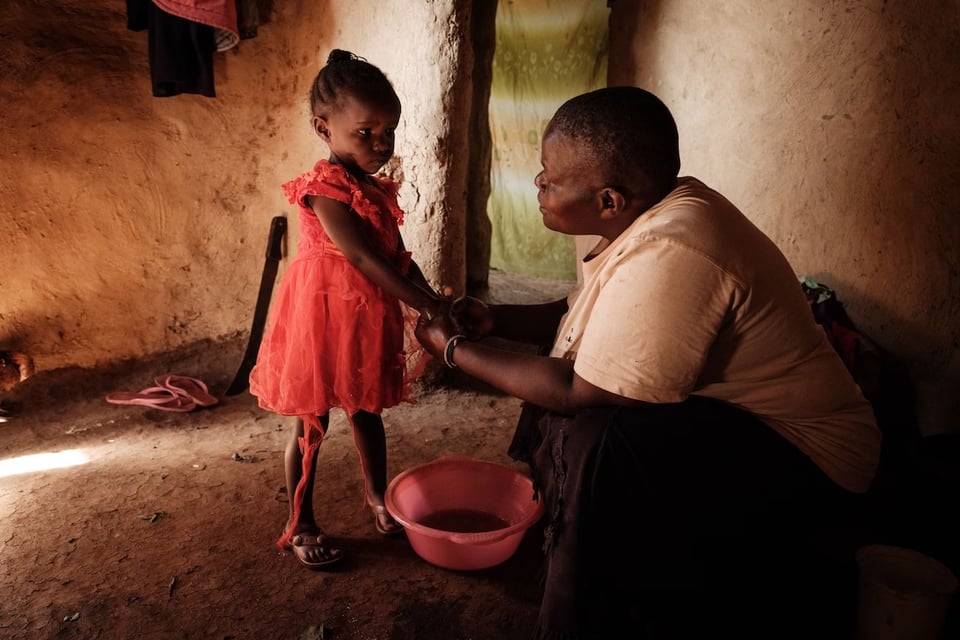Friday, December 29, 2023. Annette’s News Roundup.
I think the Roundup makes people feel not so alone.
To read an article excerpted in this Roundup, click on its blue title. Each “blue” article is hyperlinked so you can read the whole article.
Please feel free to share.
Invite at least one other person to subscribe today! https://buttondown.email/AnnettesNewsRoundup
____________________________
Joe Is always busy.
The President shows up to answer the latest GOP stupidity.
In New Hampshire, GOP presidential candidate Nikki Haley declined to say slavery was a cause of the Civil War, saying instead “it came down to the role of government.”
Yes, states rights to do what? Own slaves, Nikki.
Let the fallout continue.

____________________________
Now we know - we will win at least one more Congressional seat in Colorado in 2024.

Democratic candidate for Congress, Adam Frisch, who lost to Lauren Boebert by less than 600 votes in 2022, now has a clear path to victory in 2024.
Hakeem Jeffries -soon will be Speaker!
Boebert is shifting to a safe Republican District where the retiring Republican Congressman Ken Buck took 70% of the votes.
Even if those voters support her extremist MAGA politics, she probably hopes they haven’t followed how crazy and immoral Boebert is… or will ignore fist fights in Congress, loaded guns on Zoom, canoodling with a boyfriend at the Beetlejuice theatre. There is also the question of whether she toured insurrectionists around the Capitol on January 5th.
If she wins in 2024, she has a lifetime Congressional pension.
Lauren Boebert says she'll seek office in a different congressional district in 2024.
Rep. Lauren Boebert, the Republican congresswoman representing a huge swath of western and southern Colorado, announced Wednesday that in the 2024 election, she plans on changing districts.
Boebert said in a Facebook video that she intends to seek office in Colorado's 4th Congressional District, which covers the Eastern Plains, currently represented by Republican U.S. Rep. Ken Buck. Buck said last month that he won't seek reelection in 2024, due to the Republican Party's support of former President Donald Trump and, what he called an embrace of conspiracy theories. He's represented the district since 2015.
"I wanted to let you, my constituents and supporters, hear directly from me about my plans for the 2024 election cycle and the importance of maintaining a conservative voice for Colorado in Congress as well as keeping our Republican House majority," Boebert wrote in the caption of that Facebook video.
"I cannot put into words how grateful I am for everyone who has steadfastly stood alongside me over the past year and beyond," she continued. "I am going to do everything in my power to represent the 3rd District well for the remainder of this term as I work to earn the trust of grassroots conservative voters in the 4th District to represent them in 2025."
The full video can be seen here.
Colorado's 3rd Congressional District, which Boebert currently represents, covers the northwest corner of the state south through Grand Junction to the southeast corner, east to Pueblo and the southern central portion of the state. That district has had both Democratic and Republican representatives over the past few decades.
The 4th Congressional District includes most of the eastern half of the state, as well as Douglas County and Greeley. Aside from one-term Democratic Rep. Betsy Markey, who served from 2009 to 2011, the district hasn't seen a Democratic representative since 1973.
Boebert won her 2022 bid for reelection against Democratic challenger Adam Frisch by just over 500 votes with over 300,000 ballots cast. The race was so close it triggered an automatic recount. Frisch said he's planning to run for that district again.
It's unclear how many people will run for that seat in total, but Republicans Russ Andrews, Jeff Hurd and Curtis McCrackin announced their intent to challenge Boebert in the primary for the 3rd Congressional District. Democrats Anna Stout and Adam Withrow, along with Frisch, as well as three third-party candidates said they'll be seeking that seat too.
In 2022, Buck won reelection handily with over 60% of the vote. Boebert will face a crowded field in the primary election with six other Republican candidates having announced their intent to run. Whoever wins that bid will then face the winner of the Democratic primary; three people have announced their intent to seek the Democratic nomination.
In a statement, Boebert said she'll continue her efforts fighting for conservatives in Colorado and the U.S. and against "Democrat socialists and communists" and "Hollywood elites and national progressive groups."
Boebert was first elected to her seat in 2020, beating 10-year incumbent Scott Tipton, who Trump endorsed at the time.
Boebert lives near the western end of the state in Garfield County, hundreds of miles from the 4th Congressional District. If elected to represent the 4th Congressional District, she said she would relocate to that district. Members of Congress are not required to live in the districts they represent, only in the same state.
Colorado Democratic Party Chair Shad Murib called Boebert "cowardly" for "abandoning" her constituents, in a statement.
"Lauren Boebert can run, but she can't hide," Murib said, in part. "The good people of Western and Southern Colorado didn't wait for an election to beat Lauren Boebert -- we scared her straight and chased her out of her own district. With this carpetbagging move, Lauren Boebert has shown herself to be everything she claims she isn't: a typical swampy politician looking for a reason to call Washington D.C. home. She's a loser in CD3, and she'll be a loser in CD4."
Trent Leisy, who's running for the seat Boebert is now seeking, criticized the move from a strategic standpoint.
"Lauren Boebert has officially given the Democrats a Congressional seat by switching districts to run in my race," he tweeted Wednesday. "This move would give the Democrats control of the House. Lauren should be a fighter and keep her district red! In Congress, I would NEVER vote to expand FISA and am running in a district that I actually live in." (CBS News).

____________________________
Maine says no Trump in 2024.
Maine's top election official rules Trump ineligible for 2024 primary ballot.

CAMDEN, Maine — Maine’s top election official ruled Thursday that Donald Trump is constitutionally ineligible to appear on the state’s primary ballot next year, fueling a national effort to disqualify the former president over his attempts to overturn the 2020 election.
The decision by Maine Secretary of State Shenna Bellows, a Democrat, follows a bombshell Colorado Supreme Court ruling last week that concluded the 14th Amendment to the Constitution prohibits Trump from serving in office again due to his role in the Jan. 6 attack on the Capitol.
However, Bellows' office said her decision would not be enforced until the U.S. Supreme Court weighs in, "given the compressed timeframe, the novel constitutional questions involved, the importance of this case, and impending ballot preparation deadlines."
Trump is expected to appeal the decisions and others like it to the U.S. Supreme Court, which will likely have to settle the issue. In the meantime, state election officials and lower courts have been forced to grapple with the unprecedented constitutional question on their own.
So far most courts have sided with Trump, with recent decisions in Michigan, Arizona and Minnesota ruling against citizen-led petitions to disqualify him and affirming Trump’s right to appear on the ballot in those states.
Trump has railed against the effort to remove him from the ballot as politically motivated attempts to undemocratically disenfranchise him and his supporters.
Trump has demanded that Bellows recuse herself from the case, arguing she is too partisan — she is a former Democratic state senator — and too prejudiced because she had publicly stated she viewed the Jan. 6 attack as an “insurrection.”
“The secretary’s expression of support for the view that January 6, 2021, constituted an insurrection, and that President Trump was an ‘insurrectionist,’ is probative evidence of prejudgment and bias,” Trump’s legal team wrote in a filing Wednesday, pointing to statements she had made in previous years.
At issue is Section 3 of the 14th Amendment, which was written after the Civil War to prevent former Confederate officers from holding office in the newly reunited states. The clause bars from public office any former official who swore an oath to the Constitution and then “engaged in insurrection or rebellion.”
The Colorado Court concluded that Trump should be considered an insurrectionist for instigating violence in the lead-up to Jan. 6, though it did not enforce the decision immediately, expecting an appeal to the U.S. Supreme Court.
While the current cases pertain to whether Trump can appear on Republican primary ballots, they would lay the groundwork for potentially removing him from the ballot in next November’s general election, if upheld.
The effort to disqualify Trump under the 14th Amendment had been paid relatively little attention until the Colorado decision, but the stakes are now higher as other states consider similar arguments with little time to spare.
Both Maine and Colorado hold their primary on Super Tuesday, March 5, but federal law requires state officials to send ballots to overseas military service members and others 45 days before an election, meaning the ballots need to be prepared in January.
Politically, strategists in both parties expect the legal case against Trump to ultimately collapse and say efforts to disqualify him will likely only serve to energize his supporters and fuel his claims that he's being targeted by a vast conspiracy of powerful elite.
This article was originally published on NBCNews.com
Read the Maine decision. 👇 (source. New York Times).
https://static01.nyt.com/newsgraphics/documenttools/6306580c5b8f2be8/535310fc-full.pdf
____________________________
Democratic Congresswoman Lucy McBath of Georgia loses her district a second time.
Federal Judge accepts redrawn Georgia congressional and legislative districts that will favor Republicans.

ATLANTA (AP) — A federal judge on Thursday accepted new Georgia congressional and legislative voting districts that protect Republican partisan advantages, saying the creation of new majority-Black voting districts solved the illegal minority vote dilution that led him to order maps to be redrawn.
U.S. District Judge Steve Jones, in three separate but similarly worded orders, rejected claims that the new maps don’t do enough to help Black voters. Jones said he can’t interfere with legislative choices, even if Republicans moved to protect their power. The maps were redrawn in a recent special legislative session after Jones in October ruled that maps drawn in 2021 illegally harmed Black voters.
The maps added Black-majority districts that Jones ordered, including one in Congress, two in the state Senate and five in the state House. But in some Democratic-held districts without Black majorities, Republicans redrew the maps to favor themselves. One of those is Democratic U.S. Rep. Lucy McBath’s 7th Congressional District in suburban Atlanta.
McBath said she would seek reelection in 2024 in the new 6th Congressional District in Fulton, Cobb, Douglas and Fayette counties if the current congressional map is not overturned on appeal. It would be the second election in a row that she has had to run in a new district. The first, in 2022, was after the district she originally won was redrawn to favor Republicans.
McBath said in a statement that she wouldn’t “allow an extremist few Republicans” to “decide when my work in Congress is finished.”
The redrawing of the districts this year was among numerous redistricting actions that took place across the South after the U.S. Supreme Court upheld the 1964 Voting Rights Act in June, clearing the way for Black voters to win changes from courts. But while a case in Alabama will almost certainly result in another Democrat joining its congressional delegation, the Georgia case has played out differently.
That’s because Section 2 of the Voting Rights Act protects minority voters, but doesn’t stop Republicans from tinkering with Democratic-held districts with white majorities or where no ethnic group is in the majority. So, Georgia Republicans redrew maps while giving up few seats to Democrats.
The judge’s approval of Georgia’s redrawn maps sets the stage for their use in 2024 elections. Their implementation is likely to reproduce the current 9-5 Republican majority among Georgia’s 14 congressional seats and a 33-23 GOP margin in the Senate. Democrats are likely to gain one or two seats in a state House that now has a 102-78 Republican margin.
Plaintiffs and allied Democrats denounced the ruling, but none immediately said they would appeal. Time for an appeal is short because the 2024 elections are near.
“The Republican maps are an ongoing Voting Rights Act violation. Period,” state Senate Minority Leader Gloria Butler, a Stone Mountain Democrat, said in a written statement.
American Civil Liberties Union lawyer Ari Savitsky, who represents challengers to state legislative maps, said the new maps “don’t provide a complete fix for the injuries to Black voters that we proved in court.”
“Federal law requires an end to vote dilution everywhere and a real change for injured voters, not reshuffling the same deck,” Savitsky said.
Republicans said the ruling proves they could comply with the order to draw more majority-Black districts while preserving their power. In a written statement, House Speaker Jon Burns, a Newington Republican, called the ruling “a validation of what we put forward.”
The voters and civic groups who sued to overturn the 2021 maps claimed the new ones didn’t fix problems in districts Jones had labeled as illegal. But Jones said lawmakers weren’t confined to reworking only those districts, and that plaintiffs’ objections weren’t enough for him to reject the maps. If he had, he could have adopted maps offered by the plaintiffs or drawn his own.
Jones echoed the state’s claim that approving redrawn maps was not a beauty contest.
“To put it more starkly, plaintiffs contend that their illustrative plans are better remedies than the state’s remedial plans,” he wrote. “Because this court cannot intrude upon the domain of the General Assembly, however, it declines plaintiffs invitation to compare the 2023 remedial plans with plans preferred by plaintiffs and crown the illustrative plans the winners.”
Arguments on the congressional map focused on whether it was legal for lawmakers to dissolve McBath’s district in Gwinnett and Fulton counties — while at the same time drawing a new Black-majority 6th District west of downtown Atlanta. The plaintiffs argue that the state, by dissolving the current 7th District, is newly violating the guarantee of opportunities for minority voters spelled out in Section 2 of the federal Voting Rights Act. The 7th District is majority nonwhite, but not majority Black, with substantial shares of Hispanic and Asian voters as well. (Associated Press).
____________________________
The answer is yes to the question below.
Did anything good happen in 2023? Actually, yes!
It’s fair to say 2023 has been a difficult year in a lot of ways.
In addition to devastating wars — including in Ukraine, the Gaza Stripand Sudan — 2023 also will be Earth’s hottest year in human history, with multiple climate records broken. In the United States in 2023, the highest number of mass killings occurred in any year since at least 2006.
Despite all this, 2023 also was a year with significant positive developments, including in scientific research and medicine — and, throughout the year, moments of genuine connection and humanity shone through the bad news.
Research has indicated that uplifting news can provide an emotional buffer against distressing news and feelings of hopelessness — and even encourage optimism or action. So, in that spirit, here are some of the more uplifting developments you may have missed this year.
The WHO approved a new and affordable malaria vaccine

In Mukuli in southern Kenya, Isabela Oside, 45, washes the hands of her daughter, Faith, 3, who completed a regimen of doses in a pilot program for a malaria vaccine, March 7, 2023. (Yasuyoshi Chiba/AFP/Getty Images)
In October, the World Health Organization approved a malaria vaccine — only the second time a vaccine against the potentially deadly disease has been created. The WHO said it expects the vaccine, which costs $2-$4 per dose and has been shown to reduce symptomatic cases by 75 percent after three doses within a year, to be available by the middle of 2024.
More than 600,000 people died of malaria in 2021, with children under 5 representing 80 percent of malaria deaths in Africa. The United States reports about 2,000 malaria cases every year, the Centers for Disease Control and Prevention says, with the majority of them contracted abroad.
Tedros Adhanom Ghebreyesus, the director general of the WHO, saidthe announcement gave him “great pleasure. ... I used to dream of the day when we would have a safe and effective vaccine against malaria. Now, we have two.”
Oxford’s new malaria R21/Matrix-M vaccine approved by WHO
The FDA approved a groundbreaking pill to treat postpartum depression

In the United States, the Food and Drug Administration also approved a number of potentially life-changing drugs, including a first-of-its-kind pill to treat postpartum depression, which affects up to 1 in 5 women. The severe and debilitating condition can cause pregnant and new mothers to experience intense hopelessness and, in rare cases, psychosis — and it can last for years.
In the mystery of postpartum depression, the immune system offers clues
The new drug is taken once a day for two weeks and, unlike the existing treatment of an IV injection that may take as long as 60 hours to administer in a health-care setting, it can be taken at home — greatly improving accessibility, especially for parents caring for a newborn.
While experts say the drug may not be suitable for all women with the condition and won’t be able to treat all aspects of a new mother’s mental health, they argue that the drug is nonetheless a convenient and fast-acting treatment, and is particularly useful in the early days after a birth, when parents and babies start bonding.
What new parents need to know about groundbreaking postpartum treatment
Two sickle cell disease treatments gained approval

This electron microscope image provided by the National Institutes of Health in 2016 shows a blood cell, top, altered by sickle cell disease. (NCATS/NIH/AP)
In December, the FDA also approved two therapies for sickle cell disease, a rare and debilitating condition that affects around 100,000 Americans, most of them Black. The disease causes extreme, constant pain and can drastically cut the life span of those affected.
The new treatments are both gene therapies that have been shown in clinical trials to stop severe pain crises for most patients: One uses a harmless virus to insert a gene into the patient’s stem cells, while the other is the first medical treatment to be based on the gene-editing tool CRISPR.
Both are intensive, expensive procedures — and require chemotherapy, which has significant side effects. But patients who have received the treatments have spoken of its profoundly beneficial impact on their lives. Jimi Olaghere, a father of three who likened the pain caused by the disease to glass shards sawing back and forth inside his veins, said that after years of being unable to sleep at night because of pain, he has energy again, and that the treatment has enabled him for the first time to plan for a future with his family.
FDA approves two sickle cell therapies, including first CRISPR medicine
We learned more about dementia and memory loss — and how to prevent them

Scientists also made progress in understanding one of the biggest health concerns for countries with aging populations — dementia, which can have a devastating impact, robbing people of the ability to engage in daily tasks.
While there is no proven cure for dementia, scientific research has continued to find that there many steps we can take to reduce the risk of developing dementia.
More people are living with dementia. What are the signs and risk factors?
One study published this year suggested that lifestyle habits, including regular mental and physical activity, eating a healthful diet, and regular social contact were linked with a slower rate of memory decline. Another found that living in areas with more natural green spaces was associated with lower rates of hospital admissions for diseases including dementia, while separate research indicated that the use of hearing aids could cut the risk of cognitive decline by nearly half.
The FDA also gave full approval, for the first time, to a drug that modestly slows Alzheimer’s disease. While difficult questions about safety, effectiveness and cost remain, many neurologists say that having a drug that slows Alzheimer’s is nonetheless a milestone after years of failed trials.
After 20 years, countries agreed a treaty to protect the oceans.

Human health wasn’t the only area to see improvements this year. Even as scientists voiced concern about the state of Earth’s health, there were some positive steps to protect the planet.
In May, more than 190 countries agreed a major deal to protect the biodiversity of the world’s oceans outside of national borders, after more than two decades of talks. The United Nations adopted the treaty in June.
U.N. agrees high-seas treaty to protect ocean life
At present, only 1.2 percent of the high seas — which make up two-thirds of the planet’s ocean surface — are protected, leaving large stretches at risk from rising temperatures, overfishing, pollution, mining and other threats. The deal will allow nations to start creating new marine protection areas in the high seas for the first time, although it still may be years before U.N. member states formally adopt the agreement and are able to begin the process of designating the new zones. Even then, enforcement may be difficult.
But the agreement has been welcomed as a much-needed start on the path to protecting 30 percent of the planet’s land and sea by the year 2030, a goal announced at a U.N. biodiversity summit in late 2022.
Brazil deforestation falls after reaching 15-year high

An illegal gold mining operation in Yanomami Indigenous territory in the Brazilian state of Roraima on Feb. 24.
Last year, The Post published a series of stories showing the fast pace of destruction of Brazil’s Amazon rainforest under then-President Jair Bolsonaro. During his presidency, the rate of deforestation of the Amazon rose to a 15-year high, and those responsible for the destruction acted with impunity.
Luiz Inácio Lula da Silva returned to the presidency in January this year. His first six months in office showed positive signs, as authorities drove thousands of illegal gold miners from Indigenous lands, and the government said deforestation dropped by 50 percent.
There are questions about how likely the president is to reach his goal of ending deforestation by 2030, especially given government plans for a large-scale railway project and to pave a 540-mile highway. And deforestation isn’t the only environmental issue facing Brazil, which has come under scrutiny for its reliance on oil as it announced plans to align itself with a coalition of major oil-producing nations, OPEC Plus.
But European countries and the United States have once again offered to restart funding — which was suspended under Bolsonaro — to help end deforestation in the Amazon. Resuming the program would be a significant step for a rainforest that stores billions of tons of carbon and pulls millions more out of the atmosphere every year.
Under Lula, Amazon deforestation is declining. Can he keep it up?
Even in a year of difficult news, moments of humanity shone through
While suffering across the world may have dominated the headlines in 2023, this year also reminded us that kindness and generosity exist, even amid crises and tragedy.
In March, after tornadoes devastated Mississippi, a group of Ukrainian refugees made a 16-hour journey to distribute water to victims of the disaster. Many had only just arrived in the United States — and still had immigration forms to fill in or job interviews to prepare for — but hoped to help a community they felt faced a struggle similar to theirs.
“When they stop what they’re going through to help someone else in need, that to me is the definition of love,” Corie Jones, the deputy director of Volunteer Mississippi, told The Post.
And in October, as police officer Arizbeth Dionisio Ambrosio was clearing debris after Hurricane Otis swept Mexico, she came across a woman with a crying, hungry baby. Ambrosio, who was breastfeeding her own 1-year-old, offered to nurse the baby and was able to soothe the infant — a moment of empathy that was praised around the world, and led to her receiving a promotion.
Ambrosio told The Post she didn’t consider what she did to be anything heroic or out of the ordinary. “It was what I needed to do and I did it,” she said. “When you are in a situation like that, you do not think whether to help or not. ... I felt peace because I was with the baby giving him what he needed at the moment.” (Washington Post)
____________________________